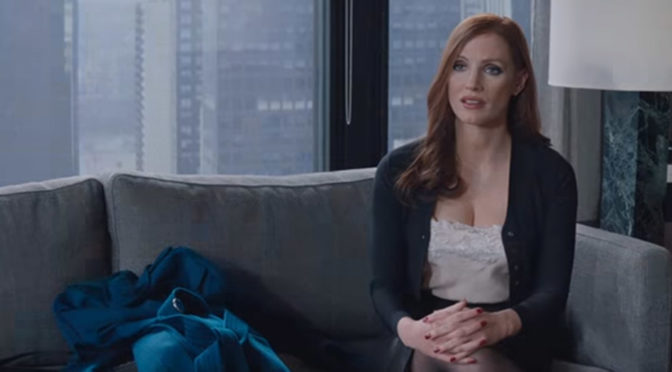Molly’s Game Blu-ray Review
Summary: Aaron Sorkin’s audio-visual choices are so overwrought they confuse the story and overshadow the actors.
2.5
Poor
With an ace, a king and a queen, Molly’s Game goes bust. It is an adaptation of the book by self-proclaimed Poker Princess, Molly Bloom. It also marks a disappointing directorial debut from screenwriter Aaron Sorkin (The Social Network, The West Wing). His verbose dialogue and intrusive visual style overcooks a major story about power, money, law and gender politics. There’s no need for overstatement with so many complex elements at stake.
Jessica Chastain stars as Molly, who was once a young Olympic skier. However, a freak accident saw her suffer a back injury and brought an end to her athletic career. In the film, she forgoes law school and opts to work in a bar. She is then hired by Dean (Jeremy Strong), an obnoxious fellow who makes her his assistant. Realising her organisational skills, he provides her with a second job: running an underground poker gamer. One of the players is simply called Player X (played by Michael Cera). In real life, this was apparently actor Tobey Maguire.
The plot overlaps two stories: Molly’s rise as she develops her own high-class gambling den in a hotel, and in the present day, her arrest and indictment. She enlists the help of a high-powered lawyer, Charlie Jaffey (Idris Elba), to represent her in court. Jaffey reads Molly’s book on the events to determine if she undertook illegal activities, and how she became involved with the Russian mafia. Meanwhile, Molly must also resolve her issues with her father (Kevin Costner), a demanding professor she fought with and from whom she is now estranged.
Midway through Molly’s Game, Aaron Sorkin loses the message of the story. A fascinating rags-to-riches, fall-from-grace narrative, in the vein of Casino (1995), becomes an overstuffed and convoluted spider’s web in need of an edit. Flashbacks and present-day scenes awkwardly collide, and Molly’s ties to the crime world are haphazardly explained. Molly’s resilience, coupled with an ethical dilemma of using men’s hedonism against them, is its own rich premise. However, Sorkin’s audio-visual choices are so overwrought they confuse the story and overshadow the actors.
Sorkin is indecisive, torn between thinking the audience is completely stupid or poker masterminds. His biggest sin is overusing voice over. The simplest images, such as setting up a new card game or Molly caressing her face with make-up, are explained via narration. Why? Molly’s Game is the first movie strictly for the blind. Similarly, Sorkin’s dialogue-heavy style verges on parody.
There are big but shapeless scenes where the quotient of Chastain and Elba’s monologues outweighs the points of their characters. It’s tough following the poker talk too if you’re unfamiliar with the game. Some of the dialogue is admittedly sharp, which reflects Sorkin’s unique ear for fast one-liners. Yet it is also gratingly, such as an end scene where Molly randomly starts discussing the smell of the centre of the galaxy. What?
Other parts are resolved in laughably contrived ways. It’s never explained why none of Dean’s players contact him about the new gaming being established without him knowing. Also, a corny father-daughter scene competes with a judge’s ruling for the most improbable moment. It’s impossible to overstate how much better Sorkin is with a collaborator or a director, as was the case with The Social Network (2010) and Steve Jobs (2015).
Sorkin also treats the story as an explosive audio-visual symphony. By over-anticipating the audience’s boredom, he has cut the film to resemble a two-and-a-half-hour-long trailer. Scenes either pound us with the voice over and an avalanche of dialogue or they’re compressed into quick cuts and montages to mobilise the story.
The movie has no concept of how powerful silences can be. Nor does it realise that bombing us with information makes us disengage from what we’re hearing. The film’s one dramatically potent scene is paired down to a single element: a character’s helplessness during a home invasion. The drama is powerful and self-explanatory, proving the ineffectiveness of sensory overload.
Sometimes it’s questionable who Molly’s Game is most interested in exploring. The film intends to dramatise Molly’s resilience to unexpected challenges in life. However, her journey comes to a halt midway while the film busily highlights several three or four male gamblers in her den. There is a man who can’t play (Spotlight’s Brian d’Arcy James), one who can’t quit (Bill Camp, excellent) and a drunk (Chris O’Dowd) who rambles to her.
The script’s flaw is that these characters have more action and agency than Molly. She is regulated to playing with a spreadsheet and watching the card games unfold. Comparatively, her descent into isolation, pills and drug-taking is superficial, reduced to random quick cuts and voice over narration. Chastain isn’t given the space to underline the physical disintegration. Molly’s Game becomes what it opposes: more interested in problematic men than the woman’s smarts.
The central performance suffers under the weight of Sorkin’s aggressive filmic style. Jessica Chastain is a fine actress, she’s in every scene, but this potentially meaty role doesn’t play to her strengths. For example, during an attractive wide shot of a skyline, the pesky voice tells us how alone Molly is rather than trusting Chastain’s expressiveness. The voice over and montages reduce the time for her to explore Molly’s emotions. Instead, the poor woman is painted as an over-calculated, super intelligent robot. Molly has no romantic feelings, which is fine, but it’s unclear whether she genuinely feels for the men falling apart in her den. That wasn’t programmed into Sorkin’s algorithm.
There are also credibility problems with the casting. Chastain bears no resemblance to the real Molly Bloom. It’s also confusing seeing her as a forty-year-old woman playing Molly at her athletic peak in her early twenties. Likewise, some of Molly’s clothes, provided by costume designer Susan Lyall, are seriously unflattering and undermine the character’s seriousness.
Molly’s Game had all the right cards at its fingertips. It had a layered, complex story to tell, and two of the best working actors today. Their work is overshadowed by Aaron Sorkin’s poor directorial choices and his over-reliance on flashy dialogue. He butchers it by compressing it down into montages, voice over, and loud conversations. It’s a showcase for his signatory fast-lipped dialogue and loses trace of Molly’s resilience to unexpected challenges and missteps. If it were retitled it wouldn’t be called Molly’s Game but Aaron’s Mess.
Special Features
Audio Commentary
Building An Empire Featurette
Blu-ray Details
Director – Aaron Sorkin
Actors – Jessica Chastain, Idris Elba, Kevin Costner, Michael Cera, Jeremy Strong
Film Genre – Drama
Label – 20th Century Fox
Audio – English (DTS-HD 7.1)
Subtitles – English
Running Time – 143
Aspect Ratio – 2.39:1
Region Coding – B (Blu-Ray)
TV Standard – HD
Rating – M
Consumer Advice – Mature themes, violence and coarse language
Year of Release – 2017
Primary Format – Movies/TV – Blu-Ray









